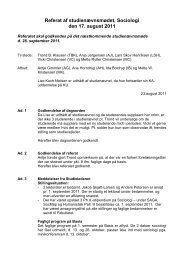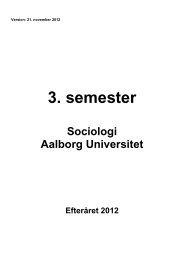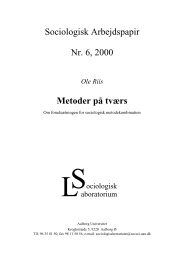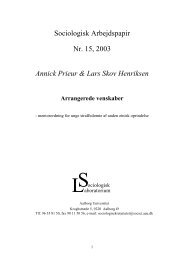Utopianism in the Work of Zygmunt Bauman - Sociologi - Aalborg ...
Utopianism in the Work of Zygmunt Bauman - Sociologi - Aalborg ...
Utopianism in the Work of Zygmunt Bauman - Sociologi - Aalborg ...
You also want an ePaper? Increase the reach of your titles
YUMPU automatically turns print PDFs into web optimized ePapers that Google loves.
teristic <strong>of</strong> <strong>the</strong>ir times and <strong>the</strong>ir etymological orig<strong>in</strong>, <strong>the</strong>se new ‘utopian’ agencies ought to use<br />
slogans such as ‘We Will Take You Nowhere’.<br />
11 Accord<strong>in</strong>g to Giddens’ <strong>the</strong>ory <strong>of</strong> structuration, to cease to make an impact <strong>in</strong> <strong>the</strong> world, to<br />
be prevented from act<strong>in</strong>g differently, means to cease to be an ‘agent’: “An agent ceases to be<br />
such if he or she loses <strong>the</strong> capability to ‘make a difference’” (Giddens 1984:14). In <strong>Bauman</strong>’s<br />
understand<strong>in</strong>g, to cease to make an impact <strong>in</strong> order to realise possibilities would more dramatically<br />
equal ceas<strong>in</strong>g to be human.<br />
12 It is noteworthy <strong>in</strong> this connection that <strong>the</strong> only book by <strong>Bauman</strong> reach<strong>in</strong>g <strong>the</strong> Top 100 <strong>in</strong><br />
<strong>the</strong> International Associations vot<strong>in</strong>g on The Book <strong>of</strong> <strong>the</strong> Century was his Postmodern Ethics<br />
placed on a relatively disappo<strong>in</strong>t<strong>in</strong>g spot <strong>in</strong> <strong>the</strong> last quarter <strong>of</strong> <strong>the</strong> one hundred most prom<strong>in</strong>ent<br />
books. The vot<strong>in</strong>g was quantitatively dom<strong>in</strong>ated by <strong>the</strong> presence <strong>of</strong> a majority <strong>of</strong> American<br />
scholars and colleagues and although <strong>the</strong> result - rest<strong>in</strong>g on a couple <strong>of</strong> hundred voters -<br />
does not tell <strong>the</strong> whole story about <strong>the</strong> most widely read or beloved <strong>of</strong> sociologists, it is still<br />
<strong>in</strong>dicative <strong>of</strong> <strong>the</strong> curriculum, canons, criteria <strong>of</strong> relevance and classics prevalent with<strong>in</strong> our<br />
discipl<strong>in</strong>e. Moreover, it is worth mention<strong>in</strong>g that <strong>Bauman</strong> himself overtly distanciates his own<br />
k<strong>in</strong>d <strong>of</strong> work from what he regards as <strong>the</strong> tendency towards a ‘science <strong>of</strong> unfreedom’ <strong>in</strong><br />
American sociology <strong>in</strong> general and especially <strong>in</strong> <strong>the</strong> work conducted by Talcott Parsons (cf.<br />
<strong>Bauman</strong> 1976b). He does ‘not feel at home’ <strong>in</strong> <strong>the</strong> k<strong>in</strong>d <strong>of</strong> work that many American debates<br />
centre on. However, he also admits that American sociology as a generic term is much to<br />
blurry, encompass<strong>in</strong>g and treacherous to allow for generalisations about <strong>the</strong> actual state <strong>of</strong><br />
American sociological work (cf. <strong>Bauman</strong> & Tester 2001:28-29).<br />
13 <strong>Bauman</strong> from his critical postmodernist perspective, just as Jacoby (1999) from his critical<br />
<strong>the</strong>oretical perspective, is worried about <strong>the</strong> apparent lack <strong>of</strong> <strong>in</strong>terest <strong>in</strong> substantial issues <strong>in</strong><br />
contemporary society where superficial or shallow agendas advanced under such head<strong>in</strong>gs as<br />
communitarianism, multiculturalism, fem<strong>in</strong>ism and environmentalism appear to reject <strong>the</strong><br />
universal aspect <strong>in</strong> <strong>the</strong>ir bitter struggles aga<strong>in</strong>st o<strong>the</strong>r utopian visions. Exclusion, as a consequence,<br />
takes precedence over <strong>in</strong>clusion. Universalism and <strong>in</strong>clusion are <strong>in</strong>herent <strong>in</strong>, <strong>in</strong>deed<br />
<strong>in</strong>tegral to, <strong>Bauman</strong>’s own plea for more visionary utopian ideas <strong>of</strong> a better world.<br />
14 <strong>Bauman</strong>’s sociological vision <strong>of</strong> contemporary society has <strong>of</strong>ten been described as explicitly<br />
pessimistic and s<strong>in</strong>ister. There is some truth <strong>in</strong> such a characterisation but it also misses<br />
out on <strong>the</strong> po<strong>in</strong>t that he never entirely gives <strong>in</strong> to this passive pessimism and s<strong>in</strong>ister defeatism.<br />
<strong>Bauman</strong>’s s<strong>in</strong>ister yet hopeful vision <strong>of</strong> a world devoid <strong>of</strong> utopias echoes that expressed<br />
by Mannheim when he stated <strong>the</strong> sombre premonitions <strong>of</strong> a reality entirely deprived <strong>of</strong> <strong>the</strong><br />
utopian spirit: “The complete disappearance <strong>of</strong> <strong>the</strong> utopian element from human thought and<br />
action would mean that human nature and human development would take on a totally new<br />
character. The disappearance <strong>of</strong> utopia br<strong>in</strong>gs about a static state <strong>of</strong> affairs <strong>in</strong> which man<br />
himself becomes noth<strong>in</strong>g more than a th<strong>in</strong>g […] Thus, after a long tortuous, but heroic development,<br />
just at <strong>the</strong> highest stage <strong>of</strong> awareness, when history is ceas<strong>in</strong>g to be bl<strong>in</strong>d fate,<br />
and is becom<strong>in</strong>g more and more man’s own creation, with <strong>the</strong> rel<strong>in</strong>quishment <strong>of</strong> utopias, man<br />
would lose his will to shape history and <strong>the</strong>rewith his ability to understand it” (Mannheim<br />
1936/1976:236). This, one <strong>of</strong> <strong>the</strong> most central <strong>of</strong> quotations and observations on utopia, also<br />
embellishes <strong>the</strong> end <strong>of</strong> <strong>the</strong> most comprehensive and monumental del<strong>in</strong>eation <strong>of</strong> and <strong>in</strong>troduction<br />
to utopian and anti-utopian thought (cf. Kumar 1987).<br />
References<br />
47










